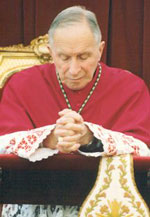In memoria eterna erit justus....

Last Saturday marked the fifteenth anniversary of the passing of Archbishop Marcel Lefebvre. One of the ways I would like to examine his life is by comparing and contrasting his life and legacy to two very different figures. On the one hand, he was very much like the Russian revolutionary figure Leon Trotsky. (Though the good Archbishop would be horrified at such a comparison.) There are, however, some striking parallels. On the one hand, both were very much major figures in their respective institutions at one time: Trotsky was head of the Red Army in post-revolutionary Russia, while Lefebvre was almost made a cardinal for his missionary work in French-speaking Africa. Both were rather stubborn in the face of the sign of the times, and both were excluded from power for it. And both died in exile from the institution they most loved.
Let us then contrast the lives of Lefebvre and the hero of the moment, the late Pope John Paul II. Lefebvre had two doctorates, but was by no means a scholar. He was a man of action. He got things done by his implacable faith and his down-to-earth approach as a son of a textile manufacturer. Karol Wotyla, on the other hand, had charisma to spare, was a gifted actor, and a flamboyant theologian and philosopher whose work, if I may be so bold, is highly over-rated. Lefebvre died a pariah, the late Pontiff a hero even in the eyes of the enemies of the Church. Whose death was most like that of the Master´s?
An even more similar comparison, however, is to Don Quixote. Like the protagonist of the magnum opus of Miguel Cervantes, Lefebvre was a figure whose day came too late. He clung to an image of the Church that even in his youth was crumbling into ruins. What he had read in books in his seminary days in Rome was no longer the reality of the Church by the early 1960´s. He continued to fight, just as the man of La Mancha, for a past that would be no more with weapons that were outdated. As he was prone to say, the Church changed, but he didn´t.
Marcel Lefebvre was one of the most significant if quixotic figures of the Church in modern times. The movement he created is taken so seriously in spite of its small numbers because he continues to serve as the conscience of the Roman Catholic Church. He reminds the Catholic Church in spite of itself what it was and what it could have been. He is the heckler in the back of the post-Vatican II theatre who refuses to be silenced.
Like Don Quixote, however, his very need for protest might be the best argument against both his cause and the cause he is fighting against.



1 Comments:
Eloquent.
I'm not convinced.
You have the the possible makings of an effective trial lawyer.
Post a Comment
<< Home